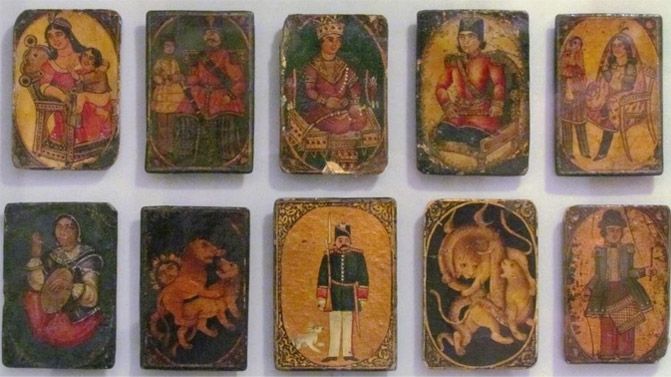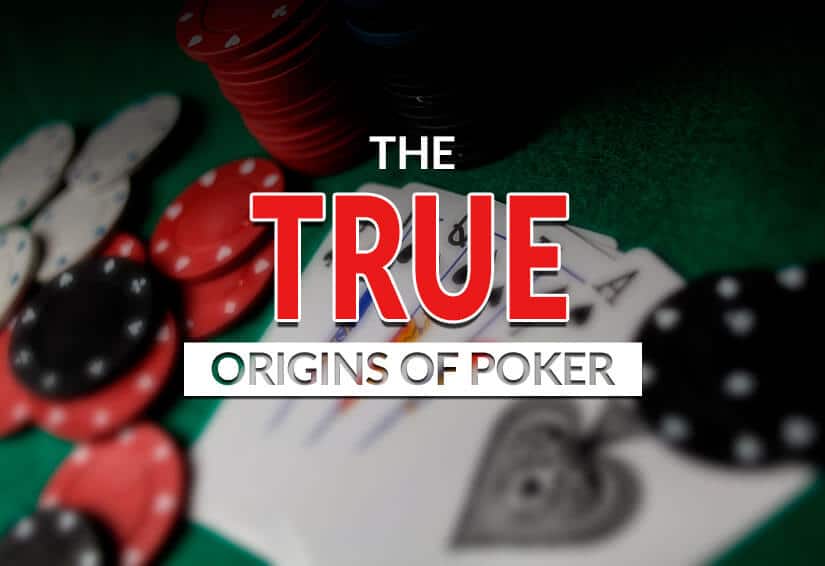Poker you may think came out of the dusty, smoky parlors of Nevada long before Las Vegas formed as the center of the game’s universe. While the evidence of poker’s actual origins is scant, there are persisting motifs that have allowed us find out a little more about the actual origins of the game.
Some attribute the birth of poker to a 9th century domino-style game in China and historians mostly agree that card games come from the East. In his book, “Chinese Origin of Playing Cards,” W.H. Wilkinson argues that the current term for both dominoes and cards is p’ai confirming popular suspicion, which naturally makes us subscribe to the theory of the Oriental origin of poker.
Yet, while China has given rise to all sorts of things, poker may have actually been invented by the French – at least to some extent – back in 14th century.
Poker’s Early Days – What We Know
For a brief moment there, it was suspected that poker was the byproduct of another game known as as As-Nas, a 16th century Persian invention. Yet, more studies have indicated that poker has more to do with the French nobility who were constantly pursuing new interests and leisurely activities, having not had to worry too much about their daily bread.

Poque, a game that dates back to 1441 and that was supposedly invented in Strasbourg, seems to be the first early evidence of the French origin of the game. Poque in particular used a 52-card deck and had three stages, to wit Melding, Pochen, and Shedding. Poque allowed players to make interesting choices during a regular game, too.
For example, a player could say “I’ll hold!” or “I’ll raise!”. Poque gave birth to many other games, including what the English called Brag and which offered elements of bluffing. If literature is any good, then a game known as La prime was mentioned in France around 1526.
The game was perhaps a little farther away from poker than was Poque, but it nevertheless offered familiar combinations, such as three of a kind, a pair, and a flux. Flux, as it turned out, simply meant flush.
Poker’s Official Birthday in Mississippi
From its earliest age, the United States has had a tenuous relation with all forms of gambling although – poker wasn’t actually recognized as such until very late, mostly to serve a political agenda.
Experts and people who have studied the game cite the Mississippi’s River Delta in the mid-1700s as the rightful birthplace of modern poker, with a number of versions developing up and down the river’s settlements.
The first time a game of poker has been mentioned in American literature, though, dates back to Joe Cowell in 1829 who wrote down a brief encounter with the game in his memoirs. One James Hildreth also mentioned poker in Dragoon Campaigns to the Rocky Mountains in 1836. More records came through the 1858 and the 1860s, with poker becoming a more common sight in the country.
Some attribute the raise in popularity of poker to the decade 1861-70 when the country was torn by the Civil War and, forced into fighting, soldiers had to distract themselves from the impending existential threat.
The American Wild West throughout the 1870s and 1880s also served as a catalyst of the development of the game, giving rise to many altercations between town folk, gunslingers, and other travelers.
The Game’s Rapid Developments and New Variants
Today, we may mostly know of a few variants of the game, but between 1850 and 1925, there was strong push to come up with new and exciting of new forms of the game. The game itself seemed great, but there were still enough rough edges to polish.
Mathematical probabilities weren’t exactly the primary concern of soldiers and cowboys, nor anyone who has dived in California because of the Gold Rush. Rather, poker was a way to assert dominance without drawing a gun – that usually came after the game.
Many changes occurred during this period. In the 1950, for example, the concept of a “flush” was developed or so written accounts suggest. There was some experimentation with lowball versions – reversing the strength of the cards backwards and split-pot games as well.
Finally, players settled for Texas Hold’em, introducing the community cards around 1925 and zapping poker all the way back to Poque.
The World Series of Poker: A Milestone in Poker History
Poker may have remained a form of entertainment between more testy individuals who didn’t mind putting real money on the line, but the desire for bigger prizes eventually led to a moment in 1970 when Benny Binion invited the seven best poker players in the Horseshoe Casino in Las Vegas.
It was because of the desire to popularize poker that the game’s most played variant today is Texas Hold’em No-Limit, a fast-paced and easy-to-comprehend iteration of the game. The event has been running uninterruptedly since 1970 when Jonny Moss was voted the world’s best player by fellow players.
Of course, the format has changed significantly and today the prize pool distributed during a regular WSOP in Las Vegas have reached $300 million.
A Gold Rush Legacy – How California Spawned a Poker Ecosystem
Even though today California is not the center of all poker action – and certainly not online – the game’s roots run deep. In 1848, the rumor that untapped seams of gold had been discovered in California prompted one of the largest mass migrations to the Sacramento Valley.
Understandably, with their lust for precious metal, the new arrivals also brought with them a beloved hobby – poker. It was over a 100 years later in the 1980s when the state legalized Omaha, Stud and Texas Hold’em poker, establishing them as the base variants to play.
Later, in 1988, the US Congress passed the Indian Gaming Regulatory Act setting-up for a conflict years later when commercial card rooms and native poker establishments would butt heads for monopoly.
Across the country, though, New York and New Jersey also saw an interest in poker, although New York’s officials resisted whereas New Jersey embraced it in full.
Finally, Online – The First Internet Poker Room and TV Broadcast
One undeniable milestone in the game’s history is transferring the game to the Internet, offering players a way to experience as much of the game without the need to be physically present in a location to do so. The arrival of Planet Poker on January 1, 1998 revolutionized poker, offering a quick way to participate in a game. Researchers have even built computers that play poker, to offer the best possible challenge to players today – a mission that took over 20 years.
The game wasn’t exactly legal in this form and lawmakers began a long and inexorable process of snuffing out this new frontier of poker gaming and bringing it under control or even equating it to a form of funding terrorist organizations.
Before poker went online, though, in 1995, Henry Orenstein invented a small camera that could be inserted directly into the poker table and broadcast players’ hands offering a better viewer experience from high-end tournaments such as the World Series of Poker.
A Legend Is Born: Chris Moneymaker Goes from $86 to $2.5M
Poker history today is made by the players who continue to arrive to the game and pull outstanding results. Chris Moneymaker is one of those gurus who not only turned an $86 satellite event from PokerStars.com into a $2.5 million in 2003, but has consistently delivered decent results, earning a total of $3,908,482.
Modern poker history – not so much of the origin of the game – is also forged by other notable players such as Phil Ivey who has won over $30,311,759 in lifetime earnings and Maria Konnikova, a researcher who decided to study poker as a pastime but has since earned $311,368.
The Future of Online Poker
The origins of poker may long have been forgotten and speculation is the best thing we have today. Yet, poker as a game itself has seen a rapid development. In 2020, the coronavirus pandemic doubled traffic to poker sites, making online competitions some of the most frequented ones.
Plus, there has been a recent U-turn from the 2011’s Department of Justice (DoJ) decision to suspend all online poker operations, including established cardrooms as PokerStars, Full Tilt Poker, and AbsolutePoker/UltimateBet.
For all the challenges poker has seen though, the game has been evolving for over 10 centuries, and it is likely to live on long past our time.





